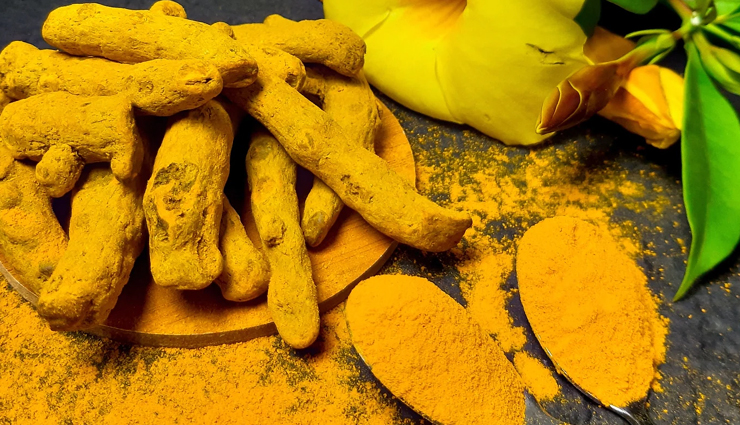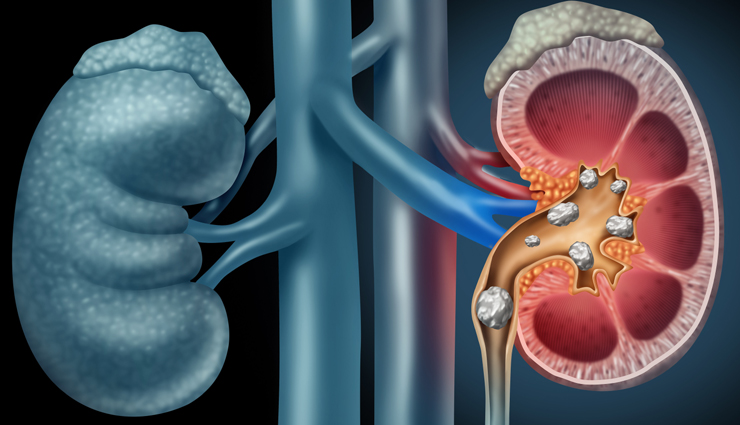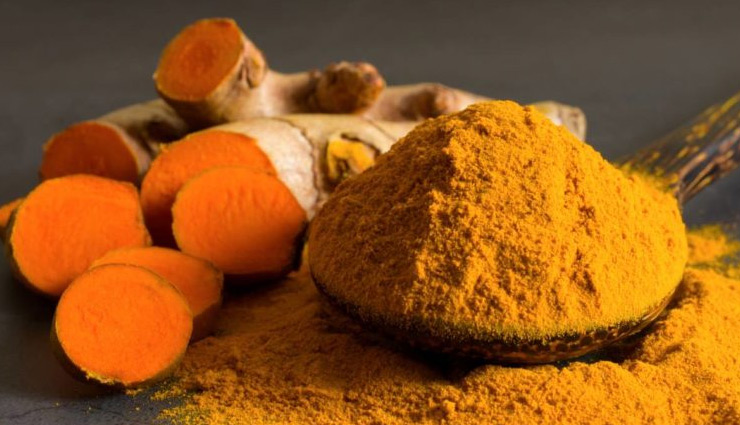- Home›
- Healthy Living›
- 11 Side Effects Of Turmeric
11 Side Effects Of Turmeric
By: Priyanka Maheshwari Tue, 24 Oct 2023 10:28:00

Discover the potential drawbacks of turmeric consumption that might give you pause. While spices like turmeric boast antioxidant and anti-inflammatory properties, excessive intake could lead to side effects such as diarrhea. Additionally, turmeric might adversely affect you with symptoms like headaches and dizziness. Explore this article to delve into the side effects of turmeric and learn about recommended dosages. Keep reading for a comprehensive understanding.
Turmeric Side Effects

# May Cause Gastrointestinal Problems
Turmeric generally doesn't cause stomach issues when consumed in cooked curries. However, taking turmeric alone or as part of arthritis treatment might lead to gastrointestinal problems. Curcumin, a compound in turmeric, caused abdominal fullness and pain in pancreatic cancer patients. Although turmeric is usually safe, it can upset the stomach in some individuals.
In a rat study, curcumin ingestion for six days resulted in stomach ulcers. If you have dyspepsia or hyperacidity, turmeric might worsen the condition. Anecdotal evidence suggests turmeric supplements could cause stomachaches, vomiting, liver damage, and menstrual changes. More research is needed, especially in adults exceeding the recommended dosage (400 mg to 3 g) for extended periods.
To prevent complications, always stick to the recommended turmeric dosage.

# May Cause Gallbladder Contractions
Research indicates that curcumin in turmeric might induce gallbladder contractions; 40 mg of curcumin led to a 50% contraction in the gallbladder. Turmeric supplements in the range of 20-40 mg were also found to increase gallbladder contractions.
Some experts suggest that the oxalate in turmeric could raise the risk of gallstones. However, direct research in this area is limited. If you are prone to gallstones or have gallbladder problems, it's crucial to consult your doctor before incorporating turmeric into your diet.
To prevent complications, it's advisable to cease turmeric consumption if you have any gallbladder issues or are taking medication for the same. Always consult a healthcare professional for personalized advice.

# May Cause Diarrhea And Nausea
Diarrhea and nausea are frequent symptoms linked to turmeric supplementation due to the irritative effect of curcumin on the gastrointestinal tract. Certain clinical studies have shown that individuals taking 0.45 to 3.6 grams of curcumin daily for four months experienced mild nausea (3.6 grams being a relatively high dose). Even low doses of curcumin can induce nausea in some people.
To prevent these symptoms, it's essential to adhere to the recommended dosage of turmeric. If you notice any adverse effects, discontinue the intake and consult your doctor promptly for guidance. Always prioritize your well-being and seek medical advice when needed.

# May Increase Risk Of Kidney Stones
According to a study, excessive turmeric consumption might elevate the risk of kidney stones due to the presence of oxalates in turmeric. Oxalates can bind with calcium, forming insoluble calcium oxalate, a major contributor to kidney stones.
The study revealed that turmeric intake led to higher urinary oxalate excretion compared to cinnamon, providing evidence for its potential to cause kidney stones.
To prevent this risk, it is advisable to abstain from turmeric if you have any kidney-related problems, especially kidney stones. Prioritize your kidney health and consult a healthcare professional for personalized advice.

# May Increase Bleeding Risk
Curcumin in turmeric has been shown to reduce platelet aggregation, potentially increasing the risk of bleeding. Regular turmeric intake might help maintain an anticoagulant state, further elevating the risk of bleeding.
Additionally, curcumin in turmeric can interfere with the functioning of blood thinners like warfarin, although it doesn't affect the medication's anticoagulation rate.
For safety, individuals taking medications such as Warfarin or Coumadin (anticoagulants) should avoid curcumin, as it could enhance the effects of these drugs.
To prevent complications, it is advisable to refrain from using turmeric if you are on blood-thinning medication. Always consult your healthcare provider for personalized advice concerning your medications and supplements.

# May Cause Allergic Reactions
Curcumin can act as a contact allergen, with some individuals reporting contact dermatitis and urticaria (a type of round skin rash) upon exposure to turmeric. Being part of the ginger family, those allergic to ginger are more likely to be allergic to turmeric. Allergic reactions can also stem from yellow food coloring, making individuals allergic to it susceptible to turmeric allergies.
Applying turmeric to the skin may cause it to turn yellow, which is harmless for most people. However, those allergic to turmeric could develop rashes or dermatitis on their faces. Research in this area is limited, and more studies are needed to understand the full extent of turmeric's effects on the skin.
Turmeric can also lead to shortness of breath, triggered by both skin contact and ingestion.
To prevent complications, individuals with a yellow food coloring allergy are advised to avoid turmeric to minimize the risk of adverse reactions. Always prioritize your health and well-being, and consult a healthcare professional if you have concerns about allergies or skin reactions.

# May Lead To Infertility
Curcumin in turmeric, as indicated by a mice study, was discovered to reduce sperm function and inhibit fertility, leading to its consideration as a potential contraceptive. Another study involving fish revealed that turmeric suppressed the development of ovarian follicles and caused subfertility, resulting in delayed conception.
There is a belief that turmeric might lower testosterone levels and impede sperm movement in men, although there is currently no solid evidence to support this claim.
To prevent potential reproductive complications, it's advisable to use turmeric in moderation and avoid excessive consumption. Prioritizing balanced intake and consulting a healthcare professional if there are concerns about reproductive health can further ensure well-being.

# May Cause Iron Deficiency
Studies in mice have shown that compounds in turmeric can bind to iron, potentially reducing the body's ability to absorb iron from food, leading to iron deficiency.
If you are dealing with iron deficiency, it's advisable to avoid turmeric and consult your doctor before including it in your diet. Prior to incorporating turmeric into your routine, it's essential to check your iron levels through a blood test for proper guidance and prevention of complications.

# May Lower Blood Pressure Way Too Much
While it might seem like a benefit, excessively lowering blood pressure can lead to complications. Turmeric is known to have hypotensive effects. If taken alongside medications designed to lower blood pressure, it could result in dangerously low levels of blood pressure.
To prevent complications, it's best to avoid turmeric if you are already on blood pressure medication. Always prioritize your health and consult your healthcare provider for personalized advice regarding supplements and medications.

# May Be Risky During Surgery
Turmeric's tendency to inhibit the blood-clotting process raises concerns, especially regarding its potential interference during surgery, although direct research in this area is limited. Patients planning for surgery should consider refraining from consuming turmeric one to two weeks before the procedure and consult their doctor for appropriate guidance.
To prevent complications, individuals contemplating surgery should avoid turmeric consumption in the specified timeframe leading up to the surgical procedure. Prioritizing open communication with healthcare professionals ensures safety and well-being during medical interventions.

# Limited Data on Effects During Pregnancy and Breastfeeding
Insufficient information exists on the potential side effects of turmeric on pregnant and breastfeeding women, both critical phases in a woman's life. As a precautionary measure, it is advisable to abstain from turmeric supplements temporarily during these periods.
Turmeric has rarely been studied in breastfeeding women, making it uncertain whether its active compounds could pass through breast milk and impact breastfed infants.
To prevent potential complications during pregnancy and breastfeeding, it is prudent to avoid turmeric supplements due to the lack of substantial data. Additionally, consulting a healthcare professional is highly recommended to ensure the safety and well-being of both the mother and the child.

Recommended Turmeric Dosage
While turmeric offers various health benefits, it's crucial to use it in the right dosage to avoid potential side effects. According to some reports, the recommended dosage for adults is 400 to 600 mg, three times a day.
Different sources suggest alternative dosages, but further research is needed to substantiate these claims. It's essential to consult your doctor before considering any of these options. Here are the suggested dosages from various sources:
Powdered dry root: 1.5 to 2.5 grams per day.
Standardized powder: 1.2 to 1.8 grams per day.
Turmeric tea: Steep 15 grams of turmeric root in 135 ml of boiling water. Take this preparation twice daily.
Water-based extract: 30 to 90 drops of the extract per day.
Tincture: 15 to 30 drops of the tincture four times per day.
Always prioritize your health and consult a healthcare professional for personalized guidance regarding the appropriate dosage of turmeric supplements.





